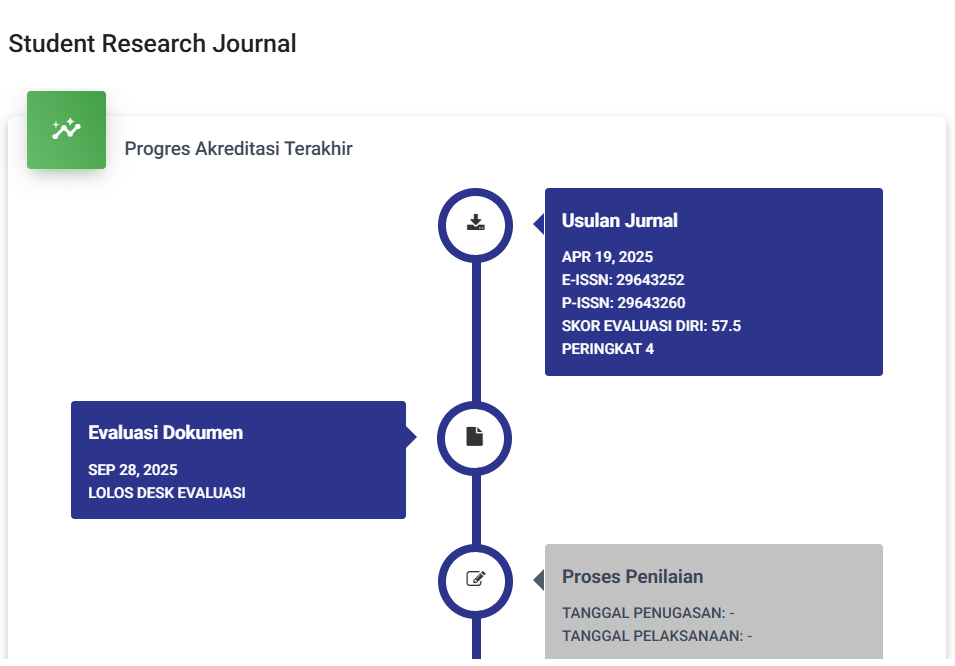Public Sector Development Strategy as a Driver of Economic Growth: An Endogenous Growth Theory Perspective
DOI:
https://doi.org/10.55606/srjyappi.v1i3.427Keywords:
Endogenous Growth Theory, Public Sector, Economic GrowthAbstract
Sustainable and stable economic growth is a key goal for many countries. As times change and global challenges become more complex, it is important for countries to develop effective strategies to promote economic growth. One sector that has an important role in this regard is the public sector. This research aims to analyse the public sector development strategy as a driver of economic growth. The current research type is qualitative. Data collection techniques include listening and recording important information to conduct data analysis through data reduction, data display, and conclusion drawing. The study results show that the public sector development strategy as a driver of economic growth plays an important role in creating a conducive environment for sustainable and inclusive economic growth. In the context of endogenous growth theory, the government has the ability to influence the determinants of economic growth through appropriate policies and actions.
References
Ausat, A. M. A., Al Bana, T., & Gadzali, S. S. (2023). Basic Capital of Creative Economy: The Role of Intellectual, Social, Cultural, and Institutional Capital. Apollo: Journal of Tourism and Business, 1(2), 42–54. https://doi.org/10.58905/apollo.v1i2.21
Ausat, A. M. A., Velmurugan, R., Mazil, M. M., Mazher, M. A., & Okombo, M. O. (2023). Utilisation of Natural Resources as a Source of Inspiration and Innovation in SME Development. Apollo: Journal of Tourism and Business, 1(3), 122–132. https://doi.org/10.58905/apollo.v1i3.103
Ceschel, F., Hinna, A., & Homberg, F. (2022). Public Sector Strategies in Curbing Corruption: A Review of the Literature. Public Organization Review, 22(3), 571–591. https://doi.org/10.1007/s11115-022-00639-4
Demir, F. (2020). Evidence-Based Policy-Making: Merits and Challenges. In Global Encyclopedia of Public Administration, Public Policy, and Governance (pp. 1–13). Springer International Publishing. https://doi.org/10.1007/978-3-319-31816-5_3901-1
Farmansyah, M. H. A., & Isnalita, I. (2020). Information and Communication Technology in Organizational Performance of Local Government. Polish Journal of Management Studies, 22(2), 127–141. https://doi.org/10.17512/pjms.2020.22.2.09
Kruk, M. E., Gage, A. D., Arsenault, C., Jordan, K., Leslie, H. H., Roder-DeWan, S., Adeyi, O., Barker, P., Daelmans, B., Doubova, S. V, English, M., García-Elorrio, E., Guanais, F., Gureje, O., Hirschhorn, L. R., Jiang, L., Kelley, E., Lemango, E. T., Liljestrand, J., … Pate, M. (2018). High-quality health systems in the Sustainable Development Goals era: time for a revolution. The Lancet Global Health, 6(11), e1196–e1252. https://doi.org/10.1016/S2214-109X(18)30386-3
Manzoor, F., Wei, L., Asif, M., Haq, M. Z. ul, & Rehman, H. ur. (2019). The Contribution of Sustainable Tourism to Economic Growth and Employment in Pakistan. International Journal of Environmental Research and Public Health, 16(19), 3785. https://doi.org/10.3390/ijerph16193785
Nguyen, Q. H. (2021). Impact of Investment in Tourism Infrastructure Development on Attracting International Visitors: A Nonlinear Panel ARDL Approach Using Vietnam’s Data. Economies, 9(3), 131. https://doi.org/10.3390/economies9030131
Sarpong, D., Boakye, D., Ofosu, G., & Botchie, D. (2023). The three pointers of research and development (R&D) for growth-boosting sustainable innovation system. Technovation, 122, 102581. https://doi.org/10.1016/j.technovation.2022.102581
Shen, M., Dhiya, A., & Kathya, K. (2021). Endogenous Growth Theory : Pengaruh Belanja Kesehatan dan Pendidikan terhadap Ekonomi. Jurnal Anggaran Dan Keuangan Negara Indonesia (AKURASI), 3(1), 20–38. https://doi.org/10.33827/akurasi2021.vol3.iss1.art93
Subagja, A. D., Ausat, A. M. A., Sari, A. R., Wanof, M. I., & Suherlan, S. (2023). Improving Customer Service Quality in MSMEs through the Use of ChatGPT. Jurnal Minfo Polgan, 12(2), 380–386. https://doi.org/https://doi.org/10.33395/jmp.v12i2.12407
Suhaili, M., Widayati, A., & Fatah, A. (2020). Government Investment in The Education Sector for Human Capital Development. The Indonesian Journal of Planning and Development, 5(2), 58–65. https://doi.org/10.14710/ijpd.5.2.58-65
Surya, B., Menne, F., Sabhan, H., Suriani, S., Abubakar, H., & Idris, M. (2021). Economic Growth, Increasing Productivity of SMEs, and Open Innovation. Journal of Open Innovation: Technology, Market, and Complexity, 7(1), 20. https://doi.org/10.3390/joitmc7010020
Wijayanto, B. (2019). Teori Pertumbuhan Endogenous (Endogenous Growth Theory). SSRN Electronic Journal, 1, 1–14. https://doi.org/10.2139/ssrn.3317961
Zhang, L., Xu, M., Chen, H., Li, Y., & Chen, S. (2022). Globalization, Green Economy and Environmental Challenges: State of the Art Review for Practical Implications. Frontiers in Environmental Science, 10, 1. https://doi.org/10.3389/fenvs.2022.870271
Zhang, Y., & Cheng, L. (2023). The role of transport infrastructure in economic growth: Empirical evidence in the UK. Transport Policy, 133, 223–233. https://doi.org/10.1016/j.tranpol.2023.01.017
Downloads
Published
How to Cite
Issue
Section
License
Copyright (c) 2023 Syamsu Rijal, Muhammad Ishlah Idrus, Muhammad Ihsan Said Ahmad

This work is licensed under a Creative Commons Attribution-ShareAlike 4.0 International License.








